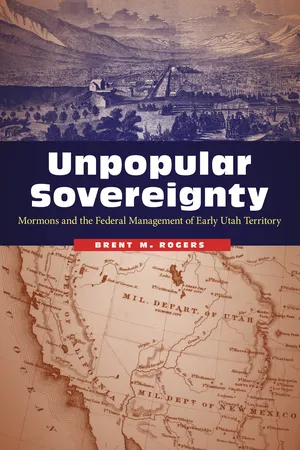
Unpopular Sovereignty
Mormons and the Federal Management of Early Utah Territory
- 400 pages
- English
- ePUB (mobile friendly)
- Only available on web
About This Book
Charles Redd Center Phi Alpha Theta Book Award for the Best Book on the American West
2018 Francis Armstrong Madsen Best Book Award from the Utah State Historical Society
2018 Best First Book Award from the Mormon History Association Newly created territories in antebellum America were designed to be extensions of national sovereignty and jurisdiction. Utah Territory, however, was a deeply contested space in which a cohesive settler group—the Mormons—sought to establish their own "popular sovereignty, " raising the question of who possessed and could exercise governing, legal, social, and even cultural power in a newly acquired territory. In Unpopular Sovereignty, Brent M. Rogers invokes the case of popular sovereignty in Utah as an important contrast to the better-known slavery question in Kansas. Rogers examines the complex relationship between sovereignty and territory along three main lines of inquiry: the implementation of a republican form of government, the administration of Indian policy and Native American affairs, and gender and familial relations—all of which played an important role in the national perception of the Mormons' ability to self-govern. Utah's status as a federal territory drew it into larger conversations about popular sovereignty and the expansion of federal power in the West. Ultimately, Rogers argues, managing sovereignty in Utah proved to have explosive and far-reaching consequences for the nation as a whole as it teetered on the brink of disunion and civil war.
Frequently asked questions
Information
Table of contents
- Cover
- Title Page
- Copyright Page
- Dedication
- Contents
- List of Illustrations
- Acknowledgments
- Introduction
- 1. Imperium in Imperio: Sovereignty and the American Territorial System
- 2. Intimate Contact: Gender, Plural Marriage, and the U.S. Army in Utah Territory, 1854–1856
- 3. Missionaries to the Indians: Mormon and Federal Indian Policies
- 4. Confronting the “Twin Relics of Barbarism”: The Mormon Question, the Buchanan Administration, and the Limits of Popular Sovereignty
- 5. The Utah War and the Westward March of Federal Sovereignty, 1857–1858
- 6. The U.S. Army and the Symbolic Conquering of Mormon Sovereignty
- 7. To 1862: The Codification of Federal Authority and the End of Popular Sovereignty in the Western Territories
- Conclusion
- Notes
- Bibliography
- Index
- About Brent M. Rogers